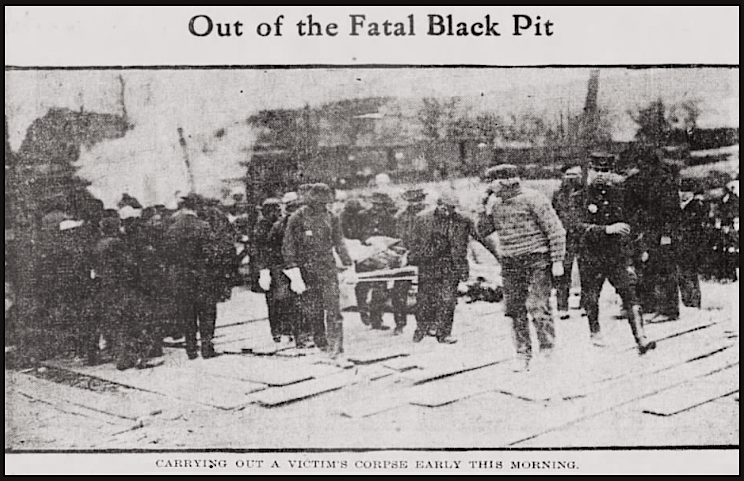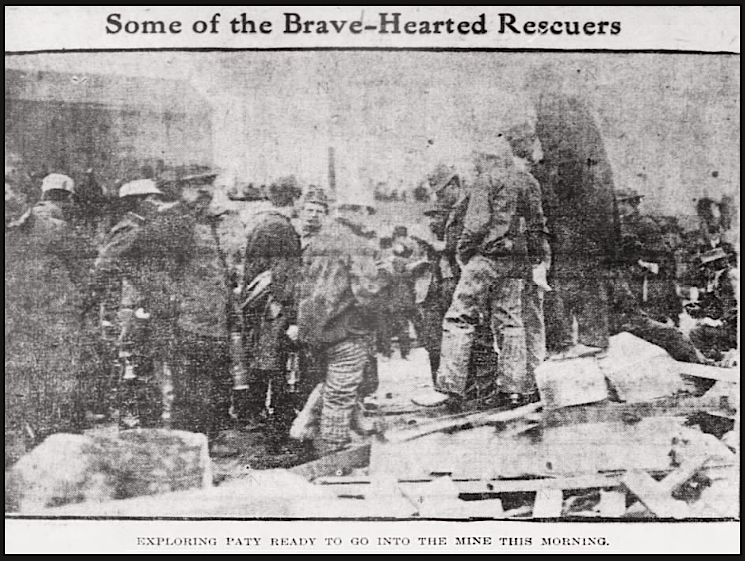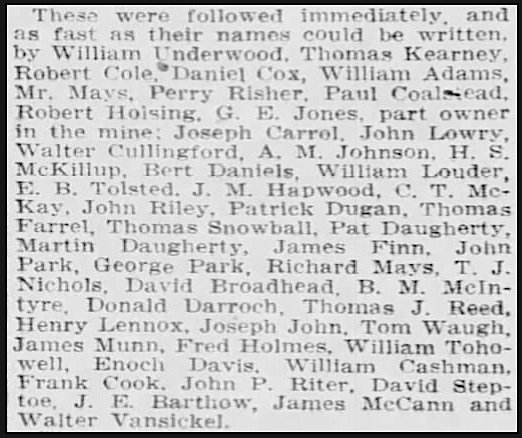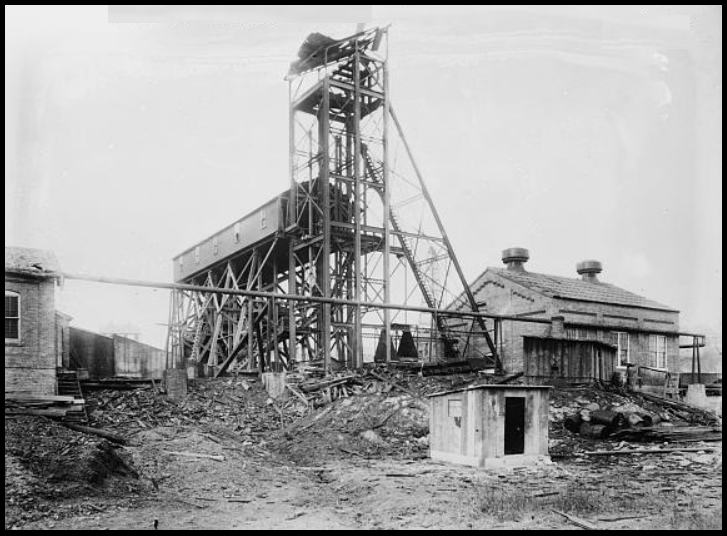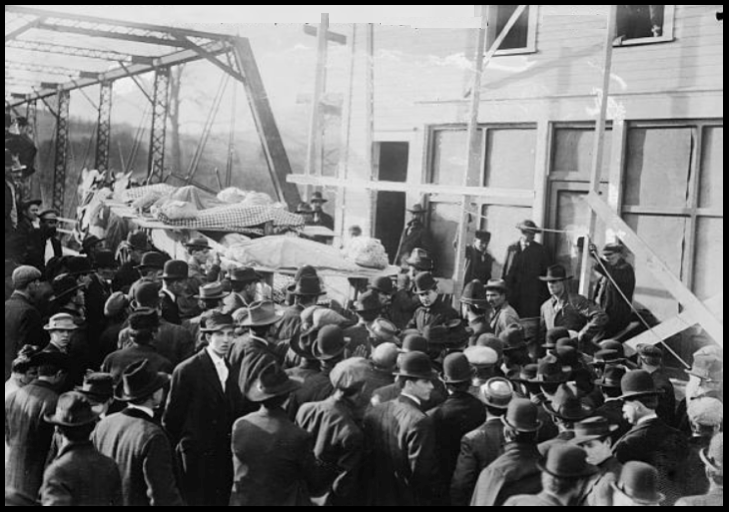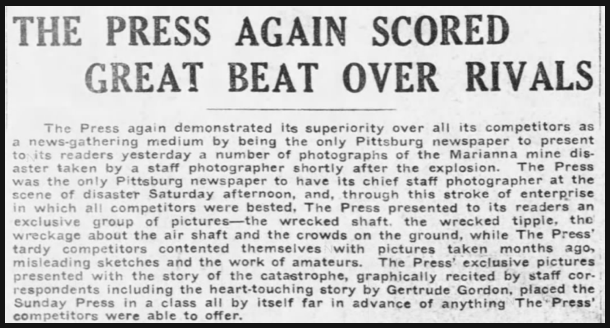
~~~~~~~~~~~~~~~~~~~~~~~~~~~~~~~~~~~~~~~~~~~~~
Hellraisers Journal – Thursday December 3, 1908
Marianna, Pennsylvania – Gertrude Gordon Interviews Lone Survivor
The heart-rending reporting of Gertrude Gordon continues from the scene of the Marianna Mine Disaster.
From the Pittsburg Press of November 30, 1908:
FEARFUL SCENES WERE ENACTED AT PIT MOUTH
[Continued.]
—–BY GERTRUDE GORDON.
Staff Corespondent of the Press
—–
—–
SOLE SURVIVOR TELLS STORY OF CATASTROPHE
—–The first body taken out was that of Fred Elvarna who is in all probability, the only man living of all who were in the mine at the time of the explosion. He was badly burned and his leg was wrenched, but he was living. In a talk with him, which, with surprising vitality he was able to give within a few hours of his rescue, he described some of his sensations in the mine. He is a bricklayer and was repairing a wall when the explosion occurred.
[He told me:]
I had just put up a brick, and was putting some mortar on it when I felt the explosion coming. It was just like a cold breath from somewhere, not exactly cold, but there was something awful seemed to come and I knew that terrible danger of some kind was there. Of course the worst danger is fire damp, after any explosion that kills more than fire or the falling timbers, and I just threw myself on the ground and dug a hole with my hands to put my face in, and threw my coat over my head.
Of course I did all that in a second and I didn’t really dig a hole, but just scooped out a handful of earth to lay my face in, so that I could breathe.
After the crash I laid quiet for a little and then when I had to move to breathe I tried to look around. It was pitch dark, of course, and the air was pretty bad, but still I could get enough to keep me going.
COULD NOT MOVE.
I couldn’t move and didn’t know how bad I was hurt, but I started yelling right away so that the boys could tell where I was when they came to hunt us. I could hear the men moaning and crying all around me, but we couldn’t get to one another. The men didn’t seem able to talk, and I cannot tell how long they moaned. I guess it was hours, but one by one they stopped, and I guess they all died.
But I kept yelling all the time. I tried to save my voice so as I would not be so weak, but every time I heard anything of the men working outside to help us I called.
Elvarna was in the mine 10 hours, being taken out at 10 o’clock Saturday night [November 28th], the accident happening at 10 o’clock in the morning.
No more bodies were taken out until 6 o’clock Sunday morning [November 29th]. As soon as they could get on the ground after the news of the explosion reached them, members of the testing laboratory at the Arsenal, which is under the direction of the United States Survey, reached the mine with the rescue apparatus. This consists of a helmet, something on the order of a diver’s helmet, but furnished with chemicals, which enable a man to breathe while in the mine. The helmet has a face covering of mica. A heavy cloth covers the head of its wearer. A rubber tube, filled with air, goes around the face between the chin and the helmet to shut out every bit of bad air. Two heavy iron cylinders in a sort of knapsack arrangement on the back of the wearer, gives oxygen to him through tubes, and two cans or cartridges, as they are called, filled with a preparation of potash receive, through tubes, the air which the man breathes out.
The whole apparatus weighs about 40 pounds, and when fully charged a man can go into the foulest air and remain there without discomfort, for two hours.
Six of these helmets came, and the men who used them were A. C. Beeson, George H. Wilkinson, William H. Kennedy and L. Kennedy and John H. Jones, the president of the Pittsburg-Buffalo Co., which owns the mine.
WENT DOWN OFTEN.
These men went down at intervals from noon until all investigation was finished the next morning. None of them got any sleep at all and very little to eat.
After the first investigation was finished and it was known there was no fire in the mine, volunteers were called on for the work of rescue. The first three who had their names put down for the rescue work were Charles Dewald, master mechanic of the Pittsburg-Buffalo Co., at Canonsburg; William Lockhart, superintendent of the Pittsburg Coal Co., Midland, Nos. 1, 2, 3 and 4, and Francis Feehan, president of the Fifth district of Federated miners [United Mine Workers of America].
[Names of the Brave Volunteers]
–These men went into the mine in relays and gathered up the bodies of the dead men. Many of the rescuers had friends and relatives in the mine, and the list holds names of the greatest mining inspectors in the State, superintendents, bosses, foreman, all men of good positions, who gave gladly of their labor for the task.
FEW BODIES WHOLE.
They would tell little of the sights down there, 425 feet below the surface of the earth, because in truth they were too awful for description, but one whom I persuaded to talk to me a little about it said that even with his experience, and he has been at several mine disasters, he never saw anything which surpassed the horror of the scenes down there in the darkness.
[He said:]
We but seldom found the whole body of a man. We stepped on hands and feet, and once on pushing something out of the way with my foot I found it was a man’s head.
The clothes were blown off the bodies and they were burned black. In some places we found the dead bodies of men who have evidently tried to crawl to a place of safety; both limbs gone, or arms, and terrible wounds from being thrown against the walls of the mine.
Scalps were torn off an, literally, scraps of human beings everywhere, is the best description I can give of it.
Around midnight, the men in authority, persuaded the women to go home and wait for morning to bring them news. The poor creatures dissented at first, but soon the entreaties of their male companions being added to those of the police and bosses, they did go. No one slept in the ill-fated town all night. To go to any house was to see people sitting with bowed heads or walking the floor in agony, Little children, not understanding, but still feeling the weight of the trouble, hushed even their cries for food and mourned, uncomprehendingly with the rest.
Many of the men had all the money they possessed with them in the mine. One woman refused to go in the house at all, but sat on her steps rocking herself and wailing in a low, dreary monotone all night. When asked to go somewhere and get warm, she would say:
“No. He cold, me cold too.”
Food seemed to nauseate her, and to all entreaties to get something to eat she would only say:
“He no eat. Me no eat.”
As soon as daylight came she was down at the mine again. Close by the ropes she stood, her eyes questioning eagerly every official that came near, and if they came close enough she would reach out a hand timidly. “My min?” she would ask. And when the answer would come in a pitying shake of his head, she would shrink back as though she had been struck.
All day she stood there waiting, her highest hope being that she would get the body of her husband.
WOMAN LOST TWO SONS.
Another woman held her two children all night in her arms, seemingly afraid to let them go for a minute for fear something would happen to them. Her two sons were in the mine.
At Miller’s boarding house where I found comfortable lodging and good meals while I was at Marianna, one of the boarders was in the mine, one man’s father was there, another’s two brothers and still another had a brother and cousin in its depths. The curious apathy which seemed to enwrap these men seemed unearthly when one thought of what they were suffering. They quietly discussed with each other the possibilities of finding the bodies. All had been working in the mine since the explosion, and at 3 o’clock in the morning, when they came to the house for a cup of coffee, they rested but a few minutes and then went back again.
Not only the humans were grieving over the disaster, but I saw a dog at the mine whose owner, I was told, was down in the shaft. The dog was a pretty hound, and if ever a brute’s eyes expressed anxiety and sorrow his did. He never whined, but he got as close to the mouth of the shaft as he could and there he staid. When chased away he would wait a while and then slink back. He watched every movement of the men around, and, when at last some one coaxed him near the fire in the raw, early morning, he still sat with his face turned to the mine, until, under the influence of the warmth and fatigue, he fell asleep, still with his head up, against a log as though he wanted to see the shaft the first thing upon awakening.
The men were gentle in their treatment of him, for he seemed to be well known and well liked, and they said that he and his master were almost inseparable. In the rush of the crowds that poured out into Marianna in the morning, I lost him.
One young girl about 16, whose father and brother were in the mine , was almost crazed with grief. She was, by their death, left completely alone in the world, and the poor thing seemed utterly crushed with despair. Some of the other women tried to comfort her but she made them no answer to all their words, just standing there with a shawl wrapped around her and never taking her eyes from the men at the shaft. I did not see her after the women were ordered home.
In one house where two families lived there were four men gone; in another two; scarcely no house but what one was missing.
While I was in the company’s office near noon on Sunday, a man came in and in a choking voice asked if he might use the telephone. He said his brother was in the mine and he wanted to send word to his wife. The dead man’s name was R. D. Crawford, and he had come to the Marianna mine about three months ago from Trenton, N. J. He leaves a wife and two children.
———-
Photographs from Bain News Service:
Marianna Mine Disaster-The Wrecked Tipple
—–
Marianna Mine Disaster, The Dead
~~~~~~~~~~~~~~~~~~~~~~
SOURCE & IMAGES
The Pittsburg Press
(Pittsburg, Pennsylvania)
-Nov 30, 1908
https://www.newspapers.com/image/142165843/
https://www.newspapers.com/image/142165906
Source re Francis Feehan as President
-of UMW District 5, elected 1906:
http://libweb1.library.iup.edu/depts/speccol/ead/mg66.html
IMAGES
Marianna Mine Disaster, Wrecked Tipple, LoC, ab Nov 28, 1908
http://www.loc.gov/pictures/item/2014683006/
Marianna Mine Disaster, The Dead, LoC, ab Nov 29, 1908
http://www.loc.gov/pictures/item/2014683002/
See also:
Hellraisers Journal – Wednesday December 2, 1908
Marianna, Pennsylvania – Heartrending Reports from Gertrude Gordon
From Marianna Mine Disaster: Mute Women Waiting, “Piteous Horror”
Note: In searching other newspaper accounts, I noticed that some of the photos therein seemed familiar. Turns out this could be the case-according to inset from front page of Pittsburg Press of November 30, 1908:
More newspaper articles re Marianna Mine Disaster:
http://www.chartiers.com/pages-new/articles/marianna.html
The Early Days of Mine Rescue
https://arlweb.msha.gov/minerescue/early.asp
~~~~~~~~~~~~~~~~~~~~~~~~~~~~~~~~~~~~~~~~~~~~~

